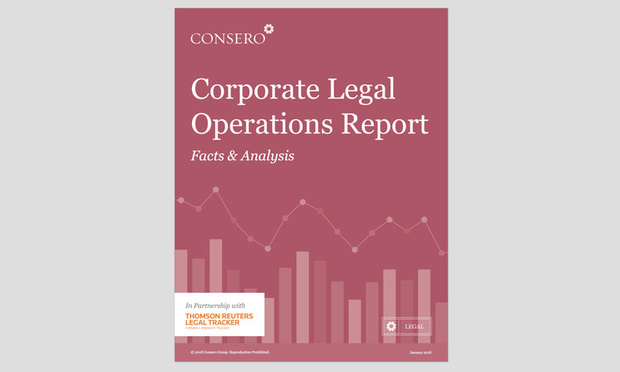Legal Ops Chiefs Want New, Better Technology in 2018
About 69 percent of respondents to a survey from Consero Group said they were working with inadequate legal technology.
January 19, 2018 at 05:39 PM
4 minute read
 Courtesy of Consero.
Courtesy of Consero. The majority of legal operations chiefs in a recent survey were unhappy with the technology in their legal departments, saying it did not meet their needs.
And most of them expected to spend more in 2018 on new technology, according to just-released survey results from Consero Group, a planner of executive conferences, in partnership with Thomson Reuters Legal Tracker.
About 69 percent of survey respondents said they were working with inadequate legal technology. The number is not so much a negative trend as an accurate reflection “that most operations functions are in mid-development,” said Mike Haven, head of legal operations at GAP Inc., based in the San Francisco area.
 Mike Haven, Senior Director, AGC, and Head of Legal Operations at Gap Inc.
Mike Haven, Senior Director, AGC, and Head of Legal Operations at Gap Inc.
“That is no surprise,” Haven explained. “The [legal ops] role is relatively new in most companies, and it takes substantial time to mature.”
The survey results seem to corroborate Haven's statements. Some 45 percent of legal ops chiefs said their operations are in use and still evolving, while 33 percent reported their functions are in the early stages of adoption.
Mark Smolik, general counsel of Columbus, Ohio-based DHL Supply Chain Americas, said he thought the 69 percent stat seemed high. But he attributed it to “a high level of review and evaluation, and perhaps dissatisfaction whether or not the technology is being leveraged to its best use, even in my own organization.” Smolik's legal department has a seven-person legal ops team, led by Kelli Saunders.
Rob Gitell, senior director of sales at Legal Tracker, said, “The pressure on legal departments to develop legal operations that deliver results is only going to increase in the next year, especially as new technologies enter the market.”
Some 54 percent of the respondents said they expect their legal technology spend to increase in 2018, while only 8 percent predicted a decrease.
One area most legal ops heads are considering is artificial intelligence. Only 8 percent of respondents said they are using AI, while 92 percent said they are in the early stages of implementing it or that it's still under development.
 Mark Smolik, DHL supply general counsel.
Mark Smolik, DHL supply general counsel.Smolik is in that 92 percent. “We've been evaluating AI extensively for use with commercial contracts for 18 months,” he said. “And we probably need another 12 months. At the end of the day when we look at what we need, the technology has not matured enough to say this is what I want to invest in. We are waiting for it to mature a bit.”
The survey, conducted at a Consero forum for senior-level legal operations executives from companies with between 5,000 to 100,000-plus employees, had 65 respondents. While not a large sample size, the group's replies still offer important insights into legal operations at their companies.
In other areas, the survey showed:
- About 78 percent of respondents reported using a third-party e-billing system, with the chief advantage being ease of reporting on legal spending and budgets.
- Some 45 percent of the legal ops chiefs have two to five staff members on their teams; 27 percent had only one person; while 17 percent have six to nine, and 11 percent have more than 10 people.
- Despite the importance of metrics, 56 percent of respondents said they did not have a formal metrics program to measure the value delivered by legal operations.
- The top priorities for respondents in 2018 are legal tech management, with 50 percent, and legal department cost control, with 45 percent. Cybersecurity and data privacy ranked a distant third, at 18 percent.
- Haven said his priority this year is process automation, both within legal and across the enterprise. “Knowledge management is also very high on the list,” he said. “The ability to leverage metrics effectively is the most important tool in our arsenal.”
For Smolik, the top priority in 2018 is upgrading technology. “We do not have the best in class,” he said, “so we are evaluating all platforms, including matter management and e-billing. We just completed an evaluation of e-discovery. And we are evaluating a lot of vendors right now.”
Smolik is moving cautiously because, he explained, most tech vendors require general counsel to commit to a three-year contract. “And three years is almost an eternity in the fast-changing world of technology,” he noted.
This content has been archived. It is available through our partners, LexisNexis® and Bloomberg Law.
To view this content, please continue to their sites.
Not a Lexis Subscriber?
Subscribe Now
Not a Bloomberg Law Subscriber?
Subscribe Now
NOT FOR REPRINT
© 2025 ALM Global, LLC, All Rights Reserved. Request academic re-use from www.copyright.com. All other uses, submit a request to [email protected]. For more information visit Asset & Logo Licensing.
You Might Like
View All
Netflix Music Guru Becomes First GC of Startup Helping Independent Artists Monetize Catalogs
2 minute read
Trending Stories
- 1Treasury GC Returns to Davis Polk to Co-Chair White-Collar Defense and Investigations Practice
- 2Decision of the Day: JFK to Paris Stowaway's Bail Revocation Explained
- 3Doug Emhoff, Husband of Former VP Harris, Lands at Willkie
- 4LexisNexis Announces Public Availability of Personalized AI Assistant Protégé
- 5Some Thoughts on What It Takes to Connect With Millennial Jurors
Who Got The Work
J. Brugh Lower of Gibbons has entered an appearance for industrial equipment supplier Devco Corporation in a pending trademark infringement lawsuit. The suit, accusing the defendant of selling knock-off Graco products, was filed Dec. 18 in New Jersey District Court by Rivkin Radler on behalf of Graco Inc. and Graco Minnesota. The case, assigned to U.S. District Judge Zahid N. Quraishi, is 3:24-cv-11294, Graco Inc. et al v. Devco Corporation.
Who Got The Work
Rebecca Maller-Stein and Kent A. Yalowitz of Arnold & Porter Kaye Scholer have entered their appearances for Hanaco Venture Capital and its executives, Lior Prosor and David Frankel, in a pending securities lawsuit. The action, filed on Dec. 24 in New York Southern District Court by Zell, Aron & Co. on behalf of Goldeneye Advisors, accuses the defendants of negligently and fraudulently managing the plaintiff's $1 million investment. The case, assigned to U.S. District Judge Vernon S. Broderick, is 1:24-cv-09918, Goldeneye Advisors, LLC v. Hanaco Venture Capital, Ltd. et al.
Who Got The Work
Attorneys from A&O Shearman has stepped in as defense counsel for Toronto-Dominion Bank and other defendants in a pending securities class action. The suit, filed Dec. 11 in New York Southern District Court by Bleichmar Fonti & Auld, accuses the defendants of concealing the bank's 'pervasive' deficiencies in regards to its compliance with the Bank Secrecy Act and the quality of its anti-money laundering controls. The case, assigned to U.S. District Judge Arun Subramanian, is 1:24-cv-09445, Gonzalez v. The Toronto-Dominion Bank et al.
Who Got The Work
Crown Castle International, a Pennsylvania company providing shared communications infrastructure, has turned to Luke D. Wolf of Gordon Rees Scully Mansukhani to fend off a pending breach-of-contract lawsuit. The court action, filed Nov. 25 in Michigan Eastern District Court by Hooper Hathaway PC on behalf of The Town Residences LLC, accuses Crown Castle of failing to transfer approximately $30,000 in utility payments from T-Mobile in breach of a roof-top lease and assignment agreement. The case, assigned to U.S. District Judge Susan K. Declercq, is 2:24-cv-13131, The Town Residences LLC v. T-Mobile US, Inc. et al.
Who Got The Work
Wilfred P. Coronato and Daniel M. Schwartz of McCarter & English have stepped in as defense counsel to Electrolux Home Products Inc. in a pending product liability lawsuit. The court action, filed Nov. 26 in New York Eastern District Court by Poulos Lopiccolo PC and Nagel Rice LLP on behalf of David Stern, alleges that the defendant's refrigerators’ drawers and shelving repeatedly break and fall apart within months after purchase. The case, assigned to U.S. District Judge Joan M. Azrack, is 2:24-cv-08204, Stern v. Electrolux Home Products, Inc.
Featured Firms
Law Offices of Gary Martin Hays & Associates, P.C.
(470) 294-1674
Law Offices of Mark E. Salomone
(857) 444-6468
Smith & Hassler
(713) 739-1250








